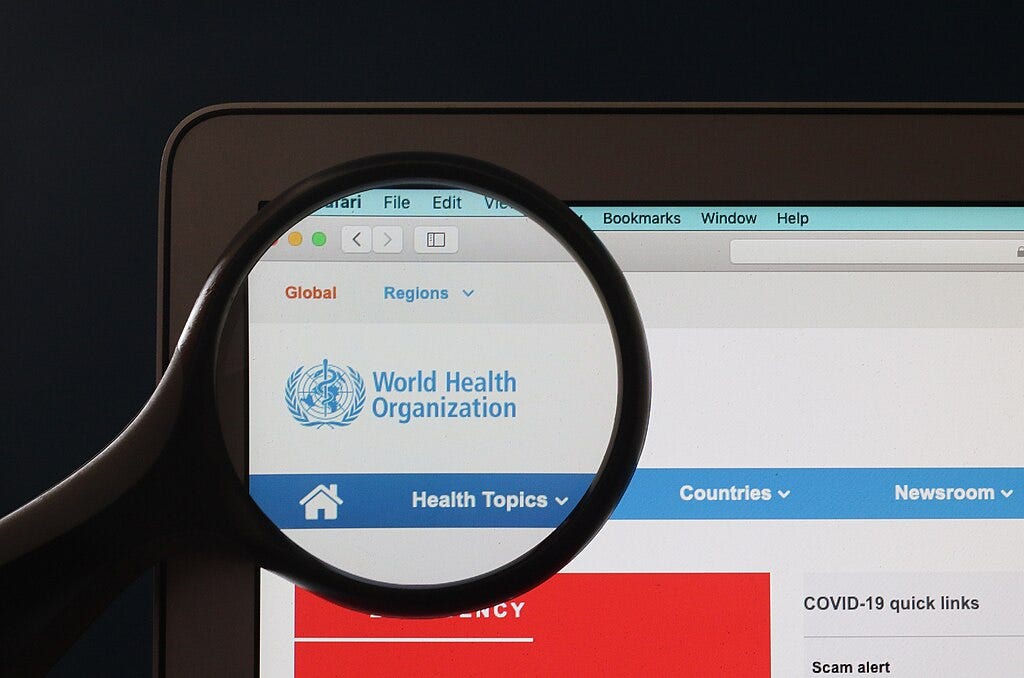News Round-Up: Absurdity of German Hate Speech Laws, Growing Opposition to WHO Agreements and The Unexpected Impact of Covid Vaccines
Every week, the editorial team of Freedom Research compiles a round-up of news that caught our eye, or what felt like under-reported aspects of news deserving more attention.
Over the past week, the following topics attracted our attention:
Opposition to new WHO agreements is growing: Republicans in the US Senate are asking the President to reject them, and the UK is not willing to lose sovereignty over the pandemic accord.
A young German female politician has been convicted of inciting hatred: she published gang rape statistics in connection with Afghan migration.
The UK government has stopped funding Global Disinformation Index, a fact-checking organisation that ignores the facts.
Research: contrary to expectations, those who receive more vaccine injections are more likely to contract Covid-19.
US government introduces pronoun mandate.
Opposition to new WHO agreements is growing: Republicans in the US Senate are asking the President to reject them, and the UK is not willing to lose sovereignty over the pandemic accord
Just over a week ago 49 members of the US Senate sent a letter to President Joe Biden to draw attention to problems related to World Health Organization’s (WHO) new agreements that are being prepared – the amendments to International Health Regulations and the pandemic accord. WHO Member States are scheduled to vote on these agreements at the World Health Assembly at the end of May.
The letter, initiated by Senator Ron Johnson, points out that the new agreements would unduly expand the WHO's powers in the event of a pandemic and therefore calls on Biden to reject them. “The WHO's failure during the Covid-19 pandemic was as total as it was predictable and did lasting harm to our country. The United States cannot afford to ignore this latest WHO inability to perform its most basic function and must insist on comprehensive WHO reforms before even considering amendments to the International Health Regulations (IHR) or any new pandemic related treaty that would increase WHO authority. We are deeply concerned that your administration continues to support these initiatives and strongly urge you to change course,” they wrote. They added that the WHO's latest publicly available draft of the pandemic response treaty is 'dead on arrival': “Instead of addressing the WHO's well-documented shortcomings, the treaty focuses on mandated resource and technology transfers, shredding intellectual property rights, infringing free speech, and supercharging the WHO.” The letter was signed by all 49 Republican senators, who are currently in the minority among the Senate's 100 members.

In another recent development, however, the UK is coming to a similar conclusion, at least on the pandemic accord – seeing that it would threaten the country's sovereignty.
Indeed, the text of the treaty states that all member states should agree to share at least a fifth of their 'pandemic-related health products' with other countries via the WHO and should not stockpile supplies. This would include therapeutics PPE and vaccines. The WHO document states the UN-run agency would get 'real-time access' to 10% of these products for free, and 10% “at affordable prices”. A source familiar with the talks told The Telegraph that the UK could not agree to such terms. In other words, the UK wants to decide for itself when and what it will share with others.
However, the head of the WHO, Tedros Adhanom Ghebreyesus, hoped a week ago that the countries would still reach an agreement so that a pandemic accord could be agreed upon at the end of May.
We have highlighted the problems related to the new WHO agreements in several articles, e.g. see here and here.
A young German female politician has been convicted of inciting hatred: she published gang rape statistics in connection with Afghan migration
Marie-Thérèse Kaiser, a member of the Alternative for Germany (Alternative für Deutschland - AfD) party, has been convicted of inciting hatred against Afghans in a court in Lower Saxony, Remix News reports. In this case, posting gang rapes statistics to social media was considered 'incitement of hatred'. Kaiser did so in response to the news that immigrants from Afghanistan were coming to live and work in her region.
In a post August 2021, Kaiser criticised Hamburg's Social Democrat (Sozialdemokratische Partei Deutschlands - SPD) mayor Peter Tschentscher, who had announced that 200 Afghan workers would be arriving in the city. Kaiser wrote that she was concerned about immigration as well as safety, asking if this meant welcoming a culture of gang rape? She added to her post an article showing that gang rapes perpetrated by Afghans are particularly frequent in Germany. The article was based on official statistics.
A German court has ruled that it was incitement to hatred and Kaiser must now pay a fine of €6,000. She will also have a criminal record.
Elon Musk, the owner of X, was also surprised by such news and asked in his social media post if Kaiser was really fined for just repeating accurate government statistics?
The UK government has stopped funding Global Disinformation Index, a fact-checking organisation that ignores the facts
British publication UnHerd recently described the process of how they had found out of their being placed on a list of publications that allegedly spread misinformation and should have therefore been boycotted by advertisers. Such lists are compiled by organisations such as the Global Disinformation Index (GDI). The GDI was founded in the UK in 2018 with an aim to disrupt the business model of publications spreading misinformation, i.e. to deprive them of advertising money. GDI's funders include the George Soros' Open Society Foundation, UK government, European Union, German Foreign Office, and a body called Disinfo Cloud, funded by the US State Department.
Founded in 2017, UnHerd has grown into a widely read publication that reaches 40 million people in the UK and US, and is read worldwide.
Their economic model has depended on paid subscriptions, but recently they became interested in advertising sales. To their surprise – and also to the surprise of three advertising agencies they worked with – they only received between 2% and 6% of the ad revenue normally expected of an audience of their size.
Asking the GDI for an explanation, they were told that their site had anti-LGBTQI+ narratives and that some of the authors who had spoken out there had been known to take 'gender-critical' beliefs. They provided Kathleen Stock, whose columns are up for National Press Award, Julie Bindel, a lifelong campaigner against violence against women, and Debbie Hayton, who is transgender, as examples of offending content. It turned out that the GDI equates “gender-critical” beliefs, or maintaining that biological sex differences exist, with “disinformation”. Although the case feels absurd, GDI refused to change UnHerd's rating. Of course, this face of the fact-checking industry is no surprise. In fact, such disinformation assessments are often not based on facts but on ideology, as was the case with UnHerd.

Naturally, the story received a fair amount of attention after being made public by UnHerd, and the publication can now confirm that, at least in the UK, their case has had some impact. In fact, UK Foreign Secretary David Cameron has confirmed that the current UK government will no longer be supporting the GDI. This was confirmed by Cameron in a letter of response to Trade and Equalities Minister Kemi Badenoch, who raised the issue following the publication of the case by UnHerd. According to Cameron, while countering disinformation from adversaries is important, 'protecting free speech is a priority for the department', and he went on to say that organisations supported by the Government should 'uphold our values'.
Research: contrary to expectations, those who receive more vaccine injections are more likely to contract Covid-19
People who have received more than one dose of the coronavirus vaccine are more likely to contract Covid-19, according to a recent study, reports The Epoch Times. Dr. Nabin Shestra and co-authors analysed the data from the employees at the Cleveland Clinic in Cleveland, Ohio, USA, and concluded that people who received two or more doses of the vaccine are at higher risk of contracting Covid-19.
The risk of contracting COVID-19 was 1.5 times higher for those who had received two doses, 1.95 times higher for those who had received three doses, and 2.5 times higher for those who had received more than three doses, the researchers found. The higher risk was compared to people who had received no vaccine or one dose of the vaccine.

“The exact reason for this finding is not clear. It is possible that this may be related to the fact that vaccine-induced immunity is weaker and less durable than natural immunity. So, although somewhat protective in the short term, vaccination may increase risk of future infection,” the researchers said in the paper, which was currently released as a preprint.
US government introduces pronoun mandate
As of the beginning of May, failing to respect a queer person’s non-binary pronouns is the newest form of workplace discrimination recognised under the landmark 1964 Civil Rights Act in the United States, UnHerd reports. The new pronoun mandate for workers, employers, and even customers was issued by the Equal Employment Opportunity Commission (EEOC) as part of the civil rights agency’s first move in a quarter-century to bring its workplace guidelines up to date with legal precedent and evolving social norms.

The document, which is technically legally non-binding but spells out the agency’s policies on investigating discrimination complaints, says that misgendering must be repeated and intentional, not a slip of the tongue, to rise to the level of workplace harassment. In its guidelines, the EEOC also decreed that it’s discriminatory for an employer to deny a transgender person access to a bathroom they feel best matches their gender identity, even if that invades the privacy of other workers, or, in some cases, conflicts with another employee’s religious convictions.




